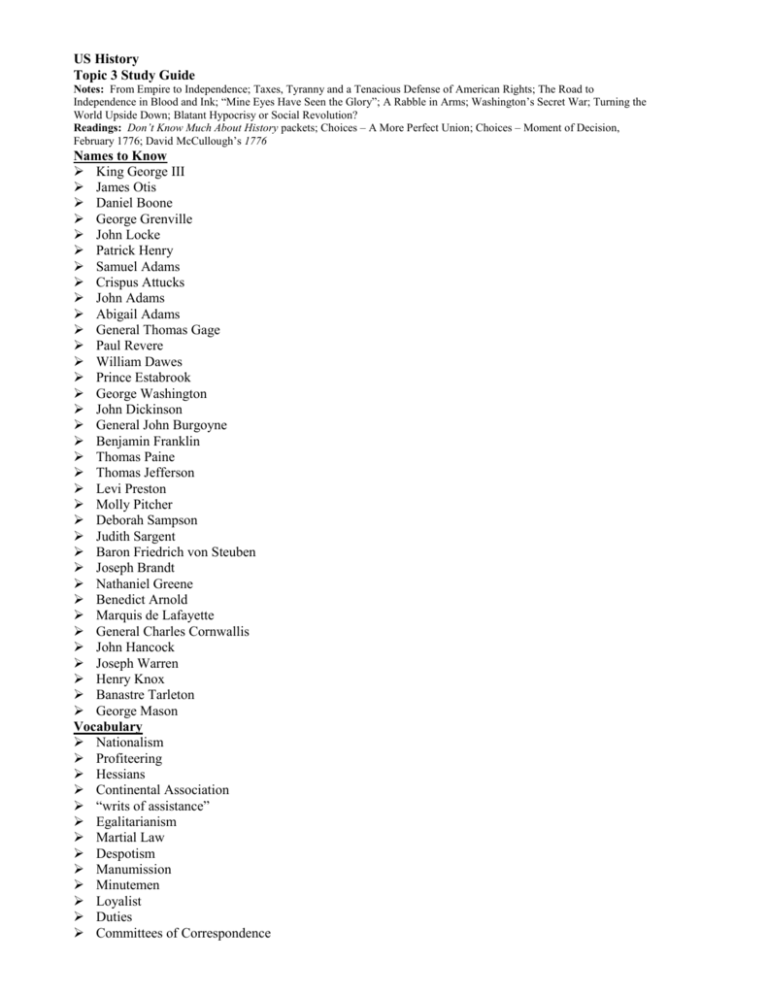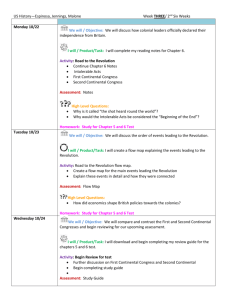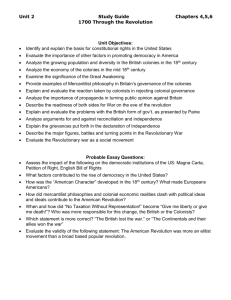Topic 3 study guide
advertisement

US History Topic 3 Study Guide Notes: From Empire to Independence; Taxes, Tyranny and a Tenacious Defense of American Rights; The Road to Independence in Blood and Ink; “Mine Eyes Have Seen the Glory”; A Rabble in Arms; Washington’s Secret War; Turning the World Upside Down; Blatant Hypocrisy or Social Revolution? Readings: Don’t Know Much About History packets; Choices – A More Perfect Union; Choices – Moment of Decision, February 1776; David McCullough’s 1776 Names to Know King George III James Otis Daniel Boone George Grenville John Locke Patrick Henry Samuel Adams Crispus Attucks John Adams Abigail Adams General Thomas Gage Paul Revere William Dawes Prince Estabrook George Washington John Dickinson General John Burgoyne Benjamin Franklin Thomas Paine Thomas Jefferson Levi Preston Molly Pitcher Deborah Sampson Judith Sargent Baron Friedrich von Steuben Joseph Brandt Nathaniel Greene Benedict Arnold Marquis de Lafayette General Charles Cornwallis John Hancock Joseph Warren Henry Knox Banastre Tarleton George Mason Vocabulary Nationalism Profiteering Hessians Continental Association “writs of assistance” Egalitarianism Martial Law Despotism Manumission Minutemen Loyalist Duties Committees of Correspondence Concepts Colonial feelings after the French & Indian War “writs of assistance” problems after the Peace of Paris (1763) for the British empire Proclamation of 1763 Problems of imperial finances and Grenville’s efforts to change Sugar Act, 1764 Stamp Act, 1765 Quartering Act, 1765 martial law effect of John Locke’s theories of government response to the Stamp Act in the colonies Virginia Resolves Parliament’s Declaratory Act Sons of Liberty Boston Massacre Tea Act of 1773 and the Boston Tea Party Committees of Correspondence Coercive Acts, or “Intolerable Acts” Second Continental Congress Declaration of American Rights Continental Association effects of “the shot heard round the world” (Lexington & Concord) effects of the Battle of Bunker Hill Olive Branch Petition Declaration of the Causes and Necessity of Taking Up Arms effects of Common Sense and American Crisis Declaration of Independence – influences? possible reasons for the Revolution effects of Saratoga Valley Forge challenges faced by Continental Army and Continental Congress Patriots and Loyalists British difficulties – why? Militias and the Continental Army – purpose, difficulties, etc. effects of frontier fighting with the Iroquois Federation reasons for British failure in the South British dominance at sea – effect? Peace of Paris (1783) revolution as an outlet for social frustrations Egalitarianism property qualifications for voting British as instrument of emancipation Manumission effect of the Revolution on women women’s voices for change “On the Equality of the Sexes” (1779) American Revolution truly a social revolution? tools of nationalism American revolution as inspiration for other revolutions Short Answer (1-2 paragraphs) John Locke’s theories and the resistance to taxation Reasons for the American victory in War American Revolution – a true social revolution? Loyalist Wedgie!






